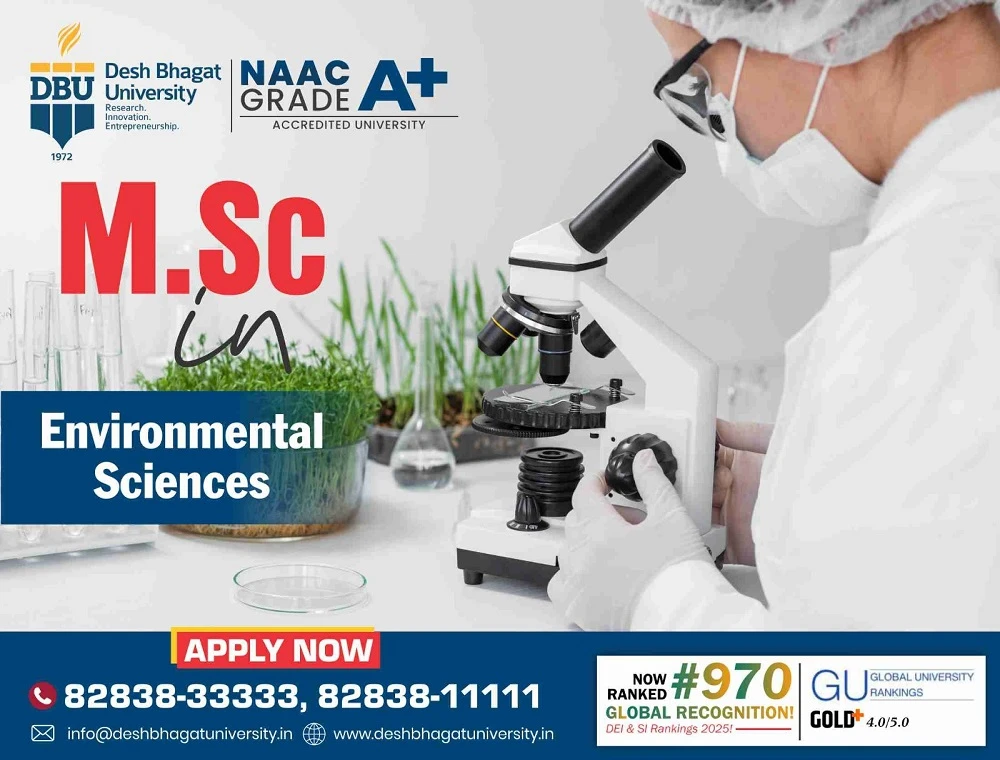MSc Environmental Science: Jobs, Scope, Syllabus, Eligibility
October 11, 2025 2025-10-11 10:00MSc Environmental Science: Jobs, Scope, Syllabus, Eligibility

MSc Environmental Science: Jobs, Scope, Syllabus, Eligibility
In recent years, environmental science has become an important area of study due to the growing environmental challenges we face. Issues like pollution control, climate change, environmental damage, and natural resource management are all critical concerns. As a result, the need for skilled professionals to address these problems is increasing quickly.
Desh Bhagat University (DBU) in Mandi Gobindgarh, Punjab, offers a Master of Science (M.Sc.) in Environmental Science program that is designed to give students the knowledge and skills needed to become leaders in the field of environmental protection.
In this article, we will look closely at the M.Sc. Environmental Science program at DBU, covering its scope, eligibility, syllabus, job opportunities, and the many career paths available to graduates. If you care about sustainability or want to help solve global environmental issues, this program provides a strong foundation to help you reach your goals.
🎓 M.Sc. Environmental Science: Course Overview
Desh Bhagat University offers a detailed and structured M.Sc. Environmental Science course that spans 2 years (4 semesters). The program is designed to provide a solid foundation in the fundamentals of environmental science, covering key aspects such as pollution control, ecology, environmental laws, and sustainable resource management.
Eligibility Criteria:
To be eligible for the M.Sc. Environmental Science program at DBU, applicants must meet the following requirements:
- Educational Qualification: The applicant must have completed a Bachelor’s degree (B.Sc.) in any science discipline (with subjects like Physics, Chemistry, and Biology/Mathematics) from a recognized university.
- Minimum Marks: A minimum of 50% marks in the undergraduate degree is required for admission.
- Entrance Test: Some students may be required to appear for an entrance exam conducted by the university, based on the number of applicants.
At DBU, the M.Sc. Environmental Science program is well-known for its high academic standards and its emphasis on developing professionals who have a thorough understanding of environmental issues. The program is designed to equip students with the skills and knowledge needed to address complex environmental challenges effectively.
🌱 Scope of M.Sc. Environmental Science
The scope of M.Sc. Environmental Science has expanded exponentially over the past few years. As the world grapples with environmental issues like pollution, deforestation, and climate change, the demand for environmental scientists, researchers, and consultants is growing.
Key Factors Contributing to the Scope:
- Increasing Environmental Challenges: With the rise in global temperatures, changes in weather patterns, and pollution, there is an increasing need for experts in environmental science to come up with innovative solutions. Professionals who can understand the impact of industrial growth, population increase, and technological advancements on the environment are in high demand.
- Government Regulations and Policies: Governments across the world are focusing more on environmental sustainability and are introducing laws and regulations to protect the environment. This has opened up opportunities in regulatory bodies and agencies like the Ministry of Environment and Forests, Pollution Control Boards, and other environmental organizations.
- Corporate Social Responsibility (CSR): Many companies have started including sustainability and environmental protection in their Corporate Social Responsibility (CSR) efforts. Because of this, organizations are now hiring environmental experts to help them reduce their environmental impact and adopt more sustainable practices. These professionals play a crucial role in guiding businesses toward eco-friendly solutions.
- Environmental Awareness among the Public: As public awareness about environmental issues grows, the need for qualified professionals to educate, advise, and develop solutions for sustainable living is also increasing. Environmental educators, outreach coordinators, and sustainable development officers are increasingly in demand.
Graduates of the M.Sc. Environmental Science program from DBU have access to a wide range of career opportunities in different sectors, including government, corporate, and non-profit organizations. They can work in roles related to environmental protection, sustainability, research, and policy development, contributing to solutions for global environmental challenges.
🧪 M.Sc. Environmental Science Syllabus
The M.Sc. Environmental Science syllabus at DBU combines both theoretical learning and practical applications, ensuring students develop a complete understanding of environmental issues and their solutions. The program is divided into 4 semesters, with each semester offering more specialized subjects and opportunities for research, helping students deepen their knowledge and skills in the field.
1st Semester: Foundation of Environmental Science
- Environmental Science Fundamentals: Introduction to environmental issues and core concepts.
- Environmental Chemistry: The study of chemical processes in the environment, including water and air pollution.
- Ecology and Biodiversity: Understanding ecosystems and the importance of biodiversity.
- Microbiology: Examining microorganisms and their role in ecosystems.
- Environmental Statistics and Data Analysis: Learning to analyze environmental data and statistics using various software tools.
2nd Semester: Pollution and Sustainability
- Environmental Pollution and Control: Examining different types of pollution (water, air, soil) and methods of controlling them.
- Sustainable Development: Focus on the concept of sustainable development and how it can be applied in various industries.
- Environmental Impact Assessment (EIA): Learning techniques to assess the potential impact of projects on the environment.
- Waste Management and Recycling: Understanding waste disposal methods and their impact on the environment.
- Climate Change and Global Warming: A deep dive into the causes, effects, and mitigation strategies for climate change.
3rd Semester: Specialized Topics in Environmental Science
- Environmental Laws and Policies: Study of national and international environmental laws, regulations, and policies.
- Environmental Biotechnology: The role of biotechnology in solving environmental problems.
- Energy and Environmental Economics: Analyzing the relationship between energy consumption and economic development.
- Water Resource Management: Techniques for sustainable water usage and management.
- Environmental Ethics and Governance: Examining the ethical dimensions of environmental decision-making.
4th Semester: Research and Dissertation
- Research Methodology: Learning how to conduct research, including experimental design, data collection, and analysis.
- Dissertation/Project Work: Students will undertake a research project or dissertation under the supervision of faculty members, allowing them to apply their knowledge to real-world environmental challenges.
The course structure is designed to provide a balanced mix of theory, practical training, and research opportunities, preparing students for a career in environmental science.
💼 Job Opportunities after M.Sc. Environmental Science
The job prospects after completing an M.Sc. in Environmental Science are vast and varied. As environmental concerns become more important, professionals in this field are in high demand. Graduates have numerous career options, including roles in government, private companies, research organizations, and NGOs. Here are some potential career paths for M.Sc. Environmental Science graduates:
- Environmental Consultant:
- Environmental consultants provide expert advice to organizations on environmental regulations, sustainability practices, and pollution control. They may work for government agencies, private firms, or environmental NGOs.
- Sustainability Manager:
- These professionals help organizations implement sustainable practices, reduce waste, and minimize their carbon footprint. Sustainability managers are essential for businesses aiming to improve their environmental impact.
- Environmental Health and Safety Officer:
- Environmental health and safety officers are responsible for ensuring that companies follow environmental safety regulations. They focus on industries such as construction, manufacturing, and oil and gas, where safety and environmental protection are critical. These officers help companies minimize their environmental impact while maintaining compliance with laws and standards.
- Waste Management Specialist:
- Waste management specialists design and manage systems for the disposal and recycling of waste, aiming to minimize environmental harm.
- Climate Change Analyst:
- Climate change analysts work with data on global warming, analyze trends in climate patterns, and create strategies for mitigating climate change impacts.
- Environmental Educator:
- Environmental educators teach individuals and communities about the importance of environmental protection and sustainable living. They work in schools, universities, and environmental NGOs.
- Research Scientist:
- Many M.Sc. Environmental Science graduates go on to work as research scientists in academic or government institutions. They may specialize in environmental chemistry, biology, or policy research.
- Environmental Policy Advisor:
- Environmental policy advisors work with government agencies and non-governmental organizations to develop policies and regulations aimed at protecting the environment.
- Environmental Auditor:
- Environmental auditors evaluate environmental compliance within organizations and industries. They ensure that companies adhere to environmental laws and standards.
After completing a M.Sc. in Environmental Science, there are many job opportunities available. Graduates can choose a career that matches their interests and skills.
🌍 Why Choose Desh Bhagat University for M.Sc. Environmental Science?
There are several reasons why Desh Bhagat University is an excellent choice for pursuing a M.Sc. in Environmental Science:
- Expert Faculty:
- DBU boasts a team of experienced faculty members who are experts in environmental science, ensuring that students receive a world-class education.
- State-of-the-Art Facilities:
- DBU provides students with modern laboratories, research centers, and fieldwork opportunities to enhance their practical knowledge and skills.
- Research Opportunities:
- The university encourages students to engage in environmental research projects, giving them hands-on experience in solving real-world environmental issues.
- Industry Linkages:
- DBU has strong links with industry leaders and environmental organizations, providing students with opportunities for internships, guest lectures, and industry placements.
- Comprehensive Curriculum:
- The M.Sc. Environmental Science program at DBU offers a well-rounded curriculum that covers everything from environmental chemistry to sustainable development, preparing students for a successful career in the field.
- Holistic Development:
- In addition to academic excellence, DBU focuses on developing students’ soft skills, including communication, problem-solving, and leadership, which are essential for success in the professional world.

📞 Admission Process
How to Apply:
- Visit the Official Website: Go to Desh Bhagat University’s admissions page.
- Fill Out the Application Form: Complete the online application form with accurate details.
- Submit Required Documents: Upload scanned copies of your academic transcripts, identification proof, and passport-sized photographs.
- Entrance Exam/Interview: Some programs may require an entrance exam or interview.
- Admission Confirmation: Upon selection, complete the admission formalities and pay the required fees.
For any queries or assistance, you can contact the admissions office at +91-82838 33333 or email contact@deshbhagatuniversity.in.
Conclusion
The M.Sc. Environmental Science program at Desh Bhagat University opens the door to a rewarding career in environmental sciences. With a robust curriculum, excellent faculty, and plenty of job opportunities, DBU provides everything you need to become a leader in the field of environmental science. Whether you want to work in research, policy, or corporate sustainability, this program gives you the knowledge, skills, and hands-on experience to succeed.
FAQs
1. What is M.Sc. Environmental Science?
M.Sc. Environmental Science is a two-year postgraduate course that focuses on understanding environmental issues like pollution, climate change, and resource management. The program provides both theoretical knowledge and practical experience, preparing students to address global environmental challenges and find sustainable solutions.
2. What are the eligibility criteria for M.Sc. Environmental Science at DBU?
To be eligible for the M.Sc. Environmental Science program at Desh Bhagat University (DBU), you need to have a Bachelor’s degree in Science (B.Sc.) with subjects like Physics, Chemistry, and Biology/Mathematics. You must have at least 50% marks in your undergraduate studies.
3. What subjects are covered in the M.Sc. Environmental Science syllabus?
The syllabus includes subjects like Environmental Chemistry, Ecology, Environmental Impact Assessment, Waste Management, Climate Change, Biodiversity, Environmental Laws, and Sustainable Development. It also includes research methodology and a final thesis, allowing students to apply their learning in real-world scenarios.
4. What career opportunities are available after completing M.Sc. Environmental Science?
After completing M.Sc. Environmental Science, you can work as an Environmental Consultant, Climate Change Analyst, Sustainability Manager, Environmental Educator, Waste Management Specialist, Research Scientist, or Environmental Policy Advisor. Jobs are available in government agencies, private companies, NGOs, and research institutions.
5. What is the scope of M.Sc. Environmental Science?
The scope of M.Sc. Environmental Science is broad and growing. There is a high demand for professionals who can address environmental problems. Graduates can work in areas like climate change, pollution control, sustainability, resource management, and environmental policy, ensuring a wide range of career opportunities.
6. Can I pursue further studies after M.Sc. Environmental Science?
Yes, after completing M.Sc. Environmental Science, you can pursue higher studies like a Ph.D. in Environmental Science, Master of Business Administration (MBA) in Sustainability, or other specialized courses. Further studies can help you become an expert in your field or move into managerial roles.
7. What are the job roles after M.Sc. Environmental Science?
Some of the job roles after M.Sc. Environmental Science include Environmental Consultant, Sustainability Manager, Climate Change Analyst, Research Scientist, and Environmental Educator. These roles allow you to work on policies, environmental solutions, and sustainability projects in both private and public sectors.
8. Is the M.Sc. Environmental Science program at DBU practical-oriented?
Yes, the M.Sc. Environmental Science program at DBU is designed to offer both theoretical knowledge and practical experience. It includes fieldwork, laboratory sessions, and a research project or thesis, giving students hands-on exposure to real-world environmental issues and solutions.
9. How can I apply for M.Sc. Environmental Science at DBU?
To apply for M.Sc. Environmental Science at DBU, visit the admission page, fill out the application form, and submit the required documents. After that, you may need to take an entrance exam. Upon selection, you can complete the admission process by paying the required fees.
10. What makes DBU’s M.Sc. Environmental Science program unique?
DBU’s M.Sc. Environmental Science program stands out because of its experienced faculty, state-of-the-art laboratories, and a comprehensive curriculum that combines theory with practical learning. DBU also offers excellent research opportunities and industry connections, preparing students for successful careers in environmental science.




